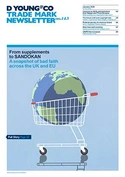Adding adjectival suffix “IC” to VIRGIN causes likelihood of confusion
Virgin Enterprises Ltd (Virgin) has won an appeal against a UKIPO decision dismissing its opposition to the mark VIRGINIC in respect of class 3 goods. The appeal was heard before the High Court.
The opposition was based on Section 5(2)(b) of the Trade Marks Act 1994, alleging a likelihood of confusion with two earlier registrations (European Union trade mark and UK trade mark) for the mark VIRGIN in class 3.
The opposition had been a fast-track dispute decided on the papers alone. The court had the benefit on appeal of hearing oral submissions from the parties.
Both parties agreed that the marks were visually and aurally similar to a high degree; that the goods in question were identical; and that there was no direct likelihood of confusion between them overall.
However, Virgin contended that the marks were also conceptually similar to more than a medium degree; that the earlier marks had more than a normal degree of distinctive character; and that there was a likelihood of indirect confusion between the marks.
Virgin argued that because the mark VIRGIN was arbitrary in relation to class 3 goods, it should be considered to have a fairly high degree of distinctive character, arguing that it would be incorrect to hold that only invented words can enjoy an enhanced degree of inherent distinctive character.
The court agreed (though noted that the mark would not enjoy as high a degree of distinctive character as an invented word).
The court disagreed that because the hearing officer held the marks to be highly similar visually and aurally, he should also have found them to be highly similar conceptually, noting that it is possible for marks to be visually and aurally similar without being conceptually similar at all, “let alone so conceptually similar”. Interestingly, the court did not give any examples to support this view.
The court agreed that because the hearing officer had found that consumers would perceive the VIRGIN element in VIRGINIC, he should have found that they would have perceived VIRGINIC to be a “newly-minted” adjective, meaning “of or pertaining to VIRGIN”.
As such there was a fairly high degree of conceptual similarity between the trade marks.
As regards the likelihood of indirect confusion (where a consumer notes that a later mark is different to an earlier mark, but also has something in common with it and thereby concludes that the later mark is another brand of the owner of the earlier mark), the court agreed that the hearing officer had fallen into error. Because the average consumer would perceive VIRGINIC as a newly-minted adjective meaning “of or pertaining to VIRGIN”, they would also likely think it was a brand extension of VIRGIN. As such indirect confusion was likely, and the appeal succeeded.
In short
This case will be welcomed by brand owners because it gives nuance to what are usually considered to be well-settled areas of trade mark law (at least as they tend to be routinely applied by hearing officers at the UKIPO in dispute matters).
The case also highlights the potential benefits of contesting certain oppositions at a hearing, rather than relying solely on written submissions.

